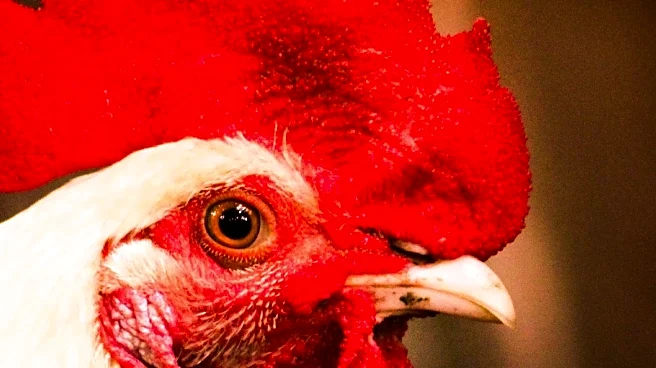What's Happening?
The bird flu virus currently affecting farm flocks across the UK is potentially the most infectious strain yet, according to Professor Ian Brown, a former director of science at the Animal and Plant Health
Agency. The UK government has implemented a mandatory housing order for poultry in England to curb the spread of the virus. This measure requires farmers to keep their birds indoors to reduce infection rates. Professor Brown emphasized the need for continuous monitoring of the virus due to its potential to mutate, which could increase its infectiousness to humans. Despite the severity of the outbreak, the UK Health Security Agency maintains that the risk to public health is very low, and the Food Standards Agency assures that properly cooked poultry and eggs remain safe for consumption.
Why It's Important?
The current bird flu outbreak poses significant challenges to the UK poultry industry, with potential economic repercussions. Farmers are required to implement stringent biosecurity measures to prevent the spread of the virus, which could lead to costly operational changes. The mandatory housing order impacts free-range poultry producers, who may face financial losses due to changes in production practices. The outbreak also highlights the importance of monitoring avian influenza viruses for mutations that could affect human health. The situation underscores the need for preparedness and robust biosecurity protocols to protect both the poultry industry and public health.
What's Next?
Farmers are advised to enhance their biosecurity measures and prepare for potential worst-case scenarios, including the culling of entire flocks if an outbreak occurs. The government will continue to monitor the situation closely, with potential adjustments to the mandatory housing order based on infection rates. Researchers and health agencies will focus on tracking virus mutations to assess any changes in its infectiousness to humans. The poultry industry may need to adapt to prolonged indoor housing conditions, which could affect production and market dynamics.
Beyond the Headlines
The outbreak raises ethical considerations regarding animal welfare, as free-range birds are confined indoors to prevent infection. This situation may lead to discussions on balancing biosecurity measures with humane treatment of livestock. Additionally, the outbreak could prompt further research into developing more effective vaccines and treatments for avian influenza, potentially influencing global health strategies.









